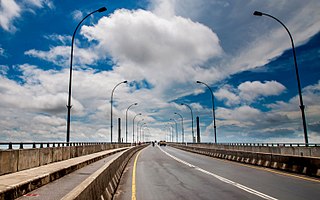
The Workers Party of Bangladesh is a communist party in Bangladesh. Rashed Khan Menon is the president of the Workers Party of Bangladesh and Anisur Rahman Mollik is the general secretary of the party.
Jagrata Muslim Janata Bangladesh, is an Islamist extremist group operating in and around northwestern Bangladesh. The Government of Bangladesh has banned the JMJB, classifying it as a terrorist organization. It is described by Bangladeshi police as an offshoot of the related Jamaat-ul-Mujahideen Bangladesh outfit.

Rapid Action Battalion or RAB, is an anti-crime and anti-terrorism unit of the Bangladesh Police. This elite force consists of members of the Bangladesh Army, Bangladesh Police, Bangladesh Navy, Bangladesh Air Force, Border Guard Bangladesh, and Bangladesh Ansar. It was formed on 26 March 2004 as RAT, and commenced operations on 14 April 2004. From 2004 to 2008 RAB had killed 1,062 people.
The Coordination Committee of Maoist Parties and Organizations of South Asia (CCOMPOSA) is an umbrella organization of various South Asian Maoist parties and movements and its purpose is to coordinate their activities throughout South Asia.

Bangladesh Krishak Sramik Awami League (BaKSAL) (Bengali: বাংলাদেশ কৃষক শ্রমিক আওয়ামী লীগ, English: Bangladesh Worker-Peasant's People's League; বাকশাল) was a political front comprising Bangladesh Awami League, the Communist Party of Bangladesh, the National Awami Party (Muzaffar) and Jatiyo League.
Purba Banglar Sarbahara Party is a communist party in Bangladesh. The party played a role in the independence struggle of the country. In the early 1970s it engaged in armed struggle supporting the new Bangladeshi state. Since then its political fortunes have dwindled, having suffered from several waves of internal divisions. The group remains active, and still carries out attacks against its opponents.

Maoist Bolshevik Reorganisation Movement of the Purba Banglar Sarbahara Party is an underground communist party in Bangladesh. It was formed in 2001, following a split from the Purba Banglar Sarbahara Party. Following the formation of PBSP(MBRM), the party revived the agrarian struggles of PBSP in the Rajbari area, seizing 3,000 bighas of land and distributing them among landless peasants. Two police camps were set up in the area to counter the influence of the party.

Jamaat-ul-Mujahideen is a terrorist organisation operating in Bangladesh. It is listed as a terror group by Bangladesh, India, Malaysia and the United Kingdom. It was founded in April 1998 in Palampur in Dhaka Division by Abdur Rahman and gained public prominence in 2001 when bombs and documents detailing the activities of the organisation were discovered in Parbatipur in Dinajpur district. The organisation was officially declared a terrorist organisation and banned by the government of Bangladesh in February 2005 after attacks on NGOs. But it struck back in mid-August when it detonated 500 small bombs at 300 locations throughout Bangladesh. The group re-organised and has committed several public murders in 2016 in northern Bangladesh as part of a wave of attacks on secularists.
The Revolutionary Internationalist Movement (RIM) was an international communist organization founded in France in March 1984 by 17 various Maoist organisations around the world. It sought to "struggle for the formation of a Communist International of a new type, based on Marxism–Leninism–Maoism". The RIM appears to be defunct as are many of the founding organisations and many changed their names over the years, or have dropped active armed struggle.

Khan Jahan Ali Bridge is a bridge over Rupsa River in Khulna, Bangladesh and named after Khan Jahan Ali. The bridge is also known as Rupsa bridge.
Gulzar Uddin Ahmed, also known as Colonel Gulzar Ahmed, was the founding director of the intelligence wing and also served Additional Director General of Rapid Action Battalion. Until his death, he was a Colonel of the Bangladesh Army and also Sector Commander and Deputy Director General of Bangladesh Rifles.
1972–1975 Bangladesh insurgency refers to the period after the independence of Bangladesh when left-wing Communist insurgents, particularly the Gonobahini fought against the government of the Prime Minister Sheikh Mujibur Rahman.

Socialism in Bangladesh differs from socialist countries where all the means of production are owned socially. Socialism is one of the four fundamental principles of state policy in the original Constitution of Bangladesh, along with nationalism, democracy and secularism. It's also mentioned in the preamble. "Socialism" has been considered in the Constitution as "a way to establish an exploitation-free society". The constitution allows cooperative and private ownership along with state ownership. The Constitution recognizes Bangladesh as a people's republic, and pledges to ensure the emancipation of peasants and workers, and endeavours to protect and improve their conditions. Like socialist constitutions, it also declares for free and compulsory education.
Shahidul Islam is a Bangladesh Nationalist Party politician and the former Member of Parliament of Kushtia-2 from 1996 to 2006 for two terms. He was known for filing cases and attacking journalists in Kushtia District.
Kazi Aref Ahmed was the President of Jatiya Samajtantrik Dal and one of the organizers of Bangladesh Liberation war.
Gono Mukti Fouz is a left wing terrorist group in Bangladesh. The organization is similar in ideology to other left-wing armed groups like Biplobi Communist Party, Purba Banglar Sarbahara Party, Purbo Banglar Communist Party (Janajuddho), and Purbo Banglar Communist Party. The group is most active in South-Western Districts of Bangladesh.
Biplobi Communist Party is a left-wing terrorist group in Bangladesh.
The Maoist insurgency in Bangladesh is an ongoing conflict between the government of Bangladesh and the PBCP and the PBCP-J.







